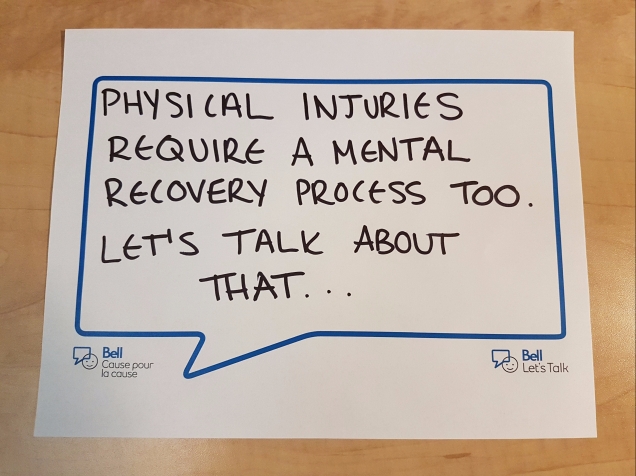
2017 was supposed to be “the year”.
The year…
I got in shape
I gained muscle
I improved my stamina on the bike
I conquered my anxiety
I finally felt comfortable again in my own skin
But, of course, life does not listen to your planning. It often does the exact opposite.
The Injury
As I’ve written about before, I suffered an injury this year. And 7 months later, I am still recovering. I injured my ulnar nerve (aka the funny bone nerve) back in June, in both arms. Most significantly in my left arm which is my dominant arm.
How did I do it? I think in my case this is the result of years of poor posture, lack of core strength, and a “slippery” ulnar nerve. I’ve had smaller issues with this nerve – numbness at night, tightness when doing certain weight exercises, elbow tenderness at work, etc. This all combined to make my arms ripe for this type of strain at some point. I think the Enbridge Ride to Conquer Cancer, and staying on my road bike for two days, in a fixed position, expedited the problem. I also suspect that I wasn’t properly fitted on my bike. (I want to be clear: I don’t fault the event itself at all. I think this was purely the result of my physiology and my position on the bike).
I knew when I first injured the arm that this wasn’t going to be a quick fix. For the first couple of days I couldn’t hold a pen. I had trouble flexing my hand. I was in a lot of pain. There was numbness. I went to a few massage therapy appointments, which helped a little, but the pain wasn’t going away. I went to the doctor, and was sent to an orthopedic surgeon for evaluation. He diagnosed me with an entrapped ulnar nerve and gave me a prescription for anti-inflammatories, physiotherapy, and a referral for a nerve function test (to be certain I hadn’t damaged the nerve permanently). I was told it could take about a month for my symptoms to subside, and to lay off cycling until I was pain free.
The First Two Months
I kept waiting for the day when I’d wake up, and the pain would be gone. I took time off from the gym, and dove into physiotherapy. While at first I thought I could get away with just riding a stationary bike, or going for runs – it soon became apparent that even those activities were causing flare ups. I stopped knitting. I had to limit my handwriting, use of my cell phone, reading, and even the way I sit on the couch had to change. Just about everything I did caused pain. It was exhausting and frustrating. It felt like every tool I regularly used to combat my anxiety was taken away from me. It left me feeling very helpless against my mental battles.
This ate away at my confidence, and my mood. I became depressed about not being able to ride my bike, or do more at the gym. I watched my social media feed become filled with people achieving goals throughout the summer, getting fitter, while I worried I was just going to become a lump. I started to monitor my calorie intake so I could do my best to ensure that while I was losing muscle, I wouldn’t gain too much fat. While I tried to stay positive, my anxiety ate away at me.
“How much muscle am I losing right now?”
“I am going to be so slow when I start running again”
“All that hard work, ruined”
“I am never going to get in shape”
“What if this is permanent?”
“What if this is a sign of something more serious like MS?”
“Are people at the gym judging me?”
“Are my friends judging me?”
“What’s going to happen when I try to workout again?”
“What if my heart is losing its conditioning, and it gives out the next time I try to run?”
“What if I can never ride my bike again?”
“What if I can never knit again?”
“Why can’t I even just hold a book?!”
“Why aren’t these drugs helping?”
“Why isn’t it gone yet?”
“I wish I had just fallen off my bike instead”
“If I had broken a bone, it would have healed by now”
“I bet I am doing something wrong, and this is why I don’t feel better”
“All these online articles say I should have recovered within 8 weeks”
Over and over, those thoughts and questions have plagued me. I can’t even sit here and say that today I no longer have these thoughts. At least once a day, most of those questions run through my mind.
Reality vs. Expectation
Over the summer, I slowly had to come to accept my reality. I wasn’t going to be running, and certainly wasn’t going to be biking. I had to back out of a cycling event in September. I stopped training for my 5km race in October. Instead, I started to just take everything one day at a time.
I had ups and downs. There was a point in late July, into August that I thought I was getting better, and had finally turned a corner. I started running again. But then, BANG, all of my symptoms came roaring back, and I was back to incredible pain and discomfort. So I stopped exercising, outside of going for long walks. For most of August, I just walked around my neighbourhood. This continued into September.
One of the hardest things has been watching others. I’d feel sad when I would have runners pass me by. I felt embarrassed to just be walking. Part of me felt like screaming “I usually run! I’m injured!!” because for some reason I craved the validation of strangers. Same thing at the gym when I’d make an appearance. I felt like others were thinking I was just wasting space by only stretching on the mats, instead of doing weights or squats, or even planks. I felt like people were thinking “why isn’t she doing more??” Even though I know, 99% of people are just focused on their own agenda at the gym, and not what I am doing. I felt like a loser, and a failure.
I had really hoped, when I was first injured, that it would just be a couple weeks and then I’d be back to normal. I never would have thought it would be January, and I’d still be experiencing symptoms. The good news was that my nerve function test came back without any signs of permanent damage. I am literally just waiting for this to go away. I am also working to correct posture, and release the muscle tension around my nerve. I still, though, get very scared that surgery might be inevitable, or that this is just going to be my life from now on.
And through it all, it’s been really difficult finding resources online with how to deal with injuries psychologically. There’s so much out there for what to do physically, but no one really writes about what your brain is going to put you through. Most well-intentioned people just keep telling you over and over to have patience, and that it will get better in time. Patience is hard. Patience is not an action. Physio at least makes me feel like I am actively doing something to help my body get better. But nothing is more frustrating for someone with anxiety than being told to wait.
The anxiety also leads to a lot of self-doubt. I’ve wondered a lot about what I’ve been doing wrong, or how I could have prevented this. You blame yourself for not being a psychic. If you’re part of a team or group, you feel like you’ve disappointed everyone. I worry about missing out on things. I can’t even think about not riding for TEALPOWER in 2018, but there’s a real good chance I’ll be unable to. I worry about how much muscle mass I’ve lost, and whether I’ll ever be able to put it back on. Over and over, your anxiety just reminds you of the possible ways you’ve failed. And then through it all, you’re physically in pain.
So I know what most of you are thinking – “just keep working and you’ll get there Tesla” and “you’re too hard on yourself!” or how about “Tesla, don’t measure your self worth against others!” I know. I know all of these things. Trust me, I’ve tried not to care about what others may or may not be thinking about me. I’ve tried to love my body as is. I’ve tried to just roll with the punches and wait for the day the pain has subsided enough that I can get back on a bike. And I’ll keep trying to make the “loud voice” in my brain that one that accepts me for who I am at any given point in time, instead of the “loud voice” being in love with the version of myself that ran a half-marathon.
I guess what I wanted people to understand is that, injuries force you to recover in two ways – mentally and physically. And sometimes, I just need to cry about being in pain, and be angry, and resentful. Sometimes I just need to let those emotions out. And sometimes I know I need to be better at reminding myself that even if this is forever, I will find ways to cope, manage, and be happy. Everything needs to be one day a time and less focused on what my world might look like six months from now. If anything being injured has been a good reminder that the best way to live your life is completely and fully in the moment.
If you’re out there, reading this and struggling to overcome an injury or chronic pain, my best advice would just be to keep focusing on what’s right in front of you, and what you can do today. If today you can go for a walk, consider that a success. If tomorrow you can’t, don’t consider that a failure. Remind yourself of the other positive things in your life, beyond whether or not you can bench press today. Have coffee with a friend, watch a funny movie, sit in the sunshine, do anything to make your heart happy. Meditate when you can. Write out your feelings. Go to the doctor and ask for help. Get a second opinion if you have to. Ask for support. And remember it’s OK to cry and be angry. Let it out, don’t hold it in. Let the feelings pass so you can then move on with your day. Keep looking forward, and stop comparing yourself to your “pre-injury” self. Trust me, it will only cause you more pain. Just keep going and remember to forgive yourself. We can do this together.
Thanks for reading as always. I’ll be Tweeting all day about #BellLetsTalk to help raise money for mental health services in Canada. Join n the conversation if you wish.
If you would like to also read my other Bell Let’s Talk Day posts, they can be found below:
2017
2016
2015

